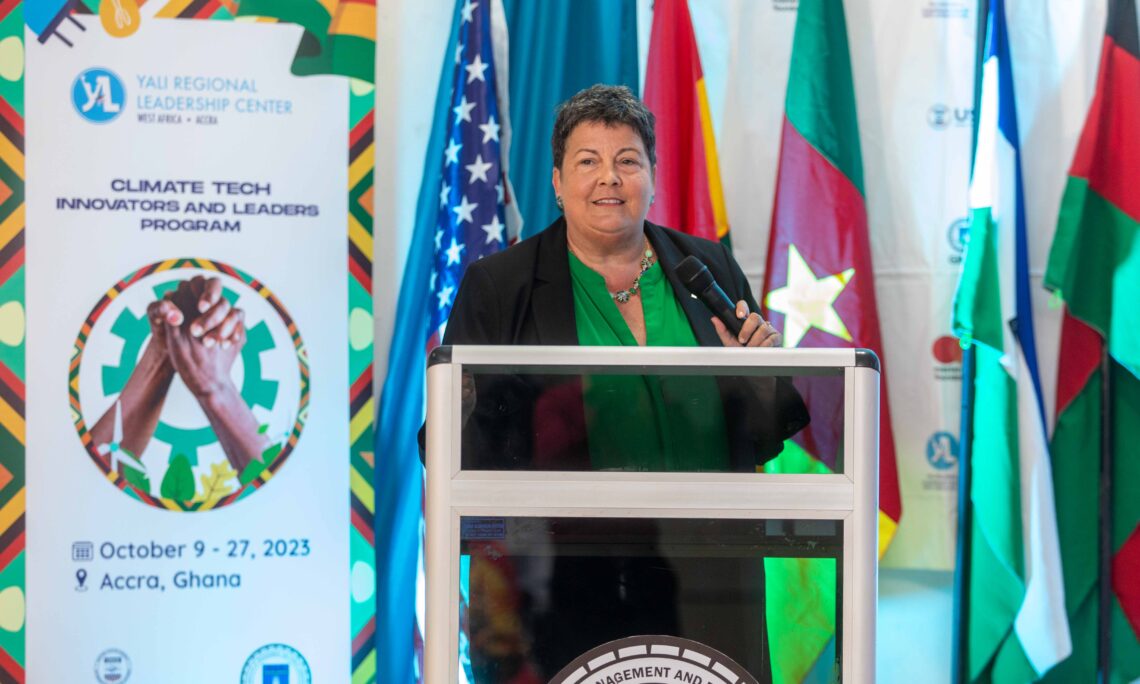50 climate tech innovators from 19 African countries have gathered in Accra for a three-week capacity-building programme, in an effort to harness the potential of young African innovators in tackling the global climate crisis.
The programme, organised by the Young African Leaders Initiative (YALI) Regional Leaders Centre, West Africa, in collaboration with the United States Embassy in Ghana, aims to equip these young innovators with the skills and knowledge necessary to address climate challenges in their respective countries.
This initiative, which forms the 45th cohort of YALI, focuses on building capacity in areas such as business enterprise, civic leadership, and public policy, with a specific emphasis on technological solutions for climate impacts on the environment, energy, agriculture, health, and the vulnerabilities faced by local communities.
Read also: African Development Bank (AfDB), Korea to advance climate-resilient technologies
Addressing the Climate Crisis in Africa
Addressing the opening session at the Ghana Institute of Management and Public Administration (GIMPA), United States Ambassador Virginia E. Palmer highlighted the significance of this program, given that 17 of the world’s most vulnerable climate countries are in Africa. She emphasised the importance of African communities actively participating in finding solutions to the global climate crisis and encouraged these young innovators to seize this opportunity to become leaders in climate action in their communities.
Ambassador Palmer recognized the urgency of addressing climate change, stating, “We need sustainable solutions to the climate crisis that rely on innovation and create new industries, new jobs, and new opportunities.” While acknowledging the challenges posed by climate change to ecosystems and economies, she also expressed optimism that the global community has the tools, knowledge, and collective will to mitigate climate change and build a sustainable future.
Dr. Esi E. Sey, the Project Director of YALI Regional Leaders Centre, underscored the role of young people in combating climate change and saving the planet. She described the program as a bold step towards leveraging the technological potential of young Africans for climate action and emphasised the need for all stakeholders in the climate space to work together to implement innovative policies and interventions that would accelerate climate action and reduce vulnerabilities in Africa.
Government Commitment to Climate Action
In a speech delivered on behalf of the government, Dr Henry Kwabena Kokofu, the Executive Director of the Environmental Protection Agency (EPA), emphasised the government’s commitment to taking sustainable actions to address the climate crisis. Dr. Kokofu described the YALI capacity-building programme as progressive because it would equip the young innovators with cutting-edge skills needed for the deployment of innovative climate change interventions.
Dr. Kokofu also highlighted various initiatives in Ghana aimed at addressing climate challenges, including the Ghana Energy Development and Access Programme (GEDAP), Sustainable Land and Water Management projects, Skills Development Fund (SDF), and the Human Resource Development Disseminating Solar PV and master course in renewable energy. These initiatives aim to encourage the youth to take advantage of programs that expand innovative technologies across the country.
World Investment Forum 2023 to raise fund for climate action, food security, others
African Vulnerability Amid Climate Concerns
Warnings about the impending dangers of climate change have intensified globally. The United Nations and the Intergovernmental Panel on Climate Change have released reports indicating that global warming is accelerating, with severe consequences for our planet, from more frequent and severe natural disasters to rising sea levels.
Africa, as one of the most vulnerable continents to climate change, is experiencing the consequences of global warming acutely. The region faces increasing droughts, erratic rainfall patterns, and a growing threat to food security. These challenges are pushing African countries to prioritise climate adaptation strategies to safeguard their future in the face of climate change.
As these young innovators gather in Ghana to build their capacity for climate action, they represent the next generation of leaders working to address the global climate crisis. Their learning and collaboration during this program are expected to contribute to innovative climate solutions, creating a brighter, more sustainable future for Africa and the world.
















